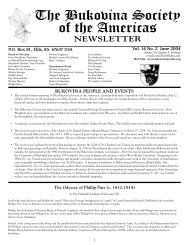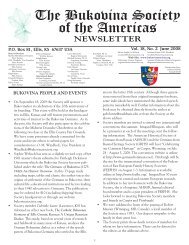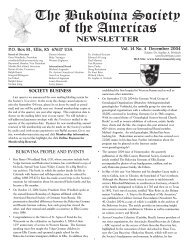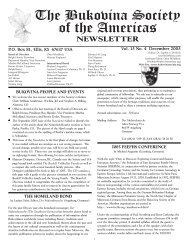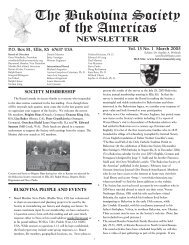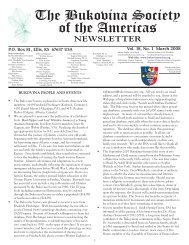March 2004 Vol. 14 #1 - Bukovina Society of the Americas
March 2004 Vol. 14 #1 - Bukovina Society of the Americas
March 2004 Vol. 14 #1 - Bukovina Society of the Americas
Create successful ePaper yourself
Turn your PDF publications into a flip-book with our unique Google optimized e-Paper software.
EASTER WATER<br />
by Irmgard Hein Ellingson (Grafton, IA)<br />
A lively e-mail discussion by members <strong>of</strong> <strong>the</strong> <strong>Bukovina</strong>-Gen List last spring<br />
prompted Board member Irmgard Hein Ellingson fur<strong>the</strong>r to research <strong>the</strong><br />
background <strong>of</strong> <strong>the</strong> Easter custom <strong>of</strong> sprinkling water on members <strong>of</strong> <strong>the</strong><br />
opposite sex on Easter Monday and Easter Tuesday. The custom entered<br />
<strong>Bukovina</strong> through <strong>the</strong> diocesan link between Galicia and <strong>Bukovina</strong>, which<br />
continued until after World War I. Bukovinians studying for <strong>the</strong> priesthood<br />
usually pursued <strong>the</strong>ir <strong>the</strong>ological studies at <strong>the</strong> University <strong>of</strong> Lemberg<br />
(Lvov), Galicia, which had been Polonized in 1871. The majority <strong>of</strong> <strong>the</strong><br />
hierarchy serving <strong>Bukovina</strong> were Poles as were most <strong>of</strong> <strong>the</strong> parish priests,<br />
although German Catholics outnumbered Polish Catholics 3:1. (editor)<br />
Easter was <strong>the</strong> major holiday <strong>of</strong> <strong>the</strong> church year for <strong>the</strong> Christian<br />
people <strong>of</strong> Central and Eastern Europe, including those in <strong>Bukovina</strong>.<br />
Ancient folklore was incorporated with religious tradition in lively<br />
festivities that celebrated life made new at springtime. Water, <strong>the</strong><br />
natural element that was believed to convey a special measure <strong>of</strong><br />
God’s grace, was used in abundance.<br />
In <strong>the</strong> early Christian church new believers were instructed in <strong>the</strong><br />
faith during Lent and <strong>the</strong>n baptized at Easter. Baptism and water have<br />
<strong>the</strong>refore been historically associated with <strong>the</strong> celebration <strong>of</strong> <strong>the</strong><br />
Resurrection <strong>of</strong> Jesus Christ throughout <strong>the</strong> centuries.<br />
The Roman Catholic tradition includes <strong>the</strong> use <strong>of</strong> holy water, which<br />
has been blessed by <strong>the</strong> priest with a prayer to ask God’s blessing on<br />
those who use it and God’s protection from <strong>the</strong> powers <strong>of</strong> darkness. To<br />
use this water with a symbol such as making <strong>the</strong> sign <strong>of</strong> <strong>the</strong> cross<br />
recalls one’s own baptism.<br />
The water blessed on Holy Saturday, or Easter Water, as it is called,<br />
differs from holy water blessed at o<strong>the</strong>r times in one regard: <strong>the</strong> Easter<br />
water has been blessed with greater solemnity when <strong>the</strong> paschal<br />
candle, which represents Our Lord risen from <strong>the</strong> dead, was dipped<br />
into it one or three times with a special prayer. This Easter Water is<br />
<strong>the</strong>n used for <strong>the</strong> administration <strong>of</strong> <strong>the</strong> Sacrament <strong>of</strong> Holy Baptism<br />
throughout <strong>the</strong> year, although <strong>the</strong> use <strong>of</strong> ordinary water is also valid<br />
(see http://landru.i-link-2.net/shnyves/holy_water2.htm, for example).<br />
Polish Catholics have <strong>the</strong> tradition <strong>of</strong> squirting or drenching one<br />
ano<strong>the</strong>r on Dyngus, or Easter Monday, which is also called Wet<br />
Monday. Boys chased <strong>the</strong> girls to get <strong>the</strong>m wet on Easter Monday and<br />
<strong>the</strong>n it was supposed to be <strong>the</strong> girls’ turn to chase <strong>the</strong> boys <strong>the</strong> next<br />
day. Poland’s Dyngu, or Smigus Day is based upon <strong>the</strong> baptism <strong>of</strong> <strong>the</strong><br />
founder <strong>of</strong> Polish Christianity, Prince Mieszko I (ruled 962 -992) and<br />
his entire court on Easter Monday 966. As a result, all Poland was<br />
united under Christian rule. Dyngus is still observed in <strong>the</strong> country<br />
and in <strong>the</strong> cities with singing, pranks, visiting, and water dousings (see<br />
Pip Wilson’s “Poland’s Dyngus Day, and o<strong>the</strong>r Easter Monday Customs”<br />
posted online at http://www.wilsonsalmanac.com/<br />
eastmond.html).<br />
Various German traditions are associated with Easter Water.<br />
Osterwasser, or water dipped silently from a stream on Easter morning,<br />
was considered to have special powers to protect humans and animals<br />
from sickness. Children baptized with its water were supposed to have<br />
unique intelligence. When this water was sprinkled in a house, it was<br />
a safeguard against vermin. In some rural communities, a girl was<br />
2<br />
supposed silently to fetch water from a spring or stream and wash<br />
with it before dawn on Easter morning, taking care not to meet<br />
anyone on <strong>the</strong> way, in order to receive special blessings. Girls would<br />
also chase boys with water because it was believed that if a girl could<br />
sprinkle a boy with Easter water, <strong>the</strong>y would soon be married.<br />
Joel Streich <strong>of</strong> New York translated <strong>the</strong> following from <strong>the</strong> book Der<br />
Kreis Wirsitz [Posen] in 1999. It is posted at “http://<br />
members.tripod.com/~radde/EasterWater.html”http://<br />
members.tripod.com/~radde/EasterWater.html:<br />
“In earlier times <strong>the</strong>re was a custom to put away Easter Water (for<br />
use) against skin and eye ailments. One had to scoop <strong>the</strong> water from<br />
a pure, flowing brook in <strong>the</strong> earliest Easter Sunday hours before<br />
sunrise and one may meet no one and speak to no one. Whoever<br />
washed himself on Easter Day with such water remained protected<br />
from skin and eye ailments.<br />
“One saw young girls wending <strong>the</strong>ir way to <strong>the</strong> nearest clear stream<br />
in <strong>the</strong> gray early morning hours to ga<strong>the</strong>r <strong>the</strong> water which was<br />
supposed to bestow beauty and virtue. The way <strong>the</strong>re and home<br />
again had to be paced silently. That wasn’t easy since young boys<br />
and envious women attempted to hinder <strong>the</strong>m with that, to startle<br />
<strong>the</strong>m and to tempt <strong>the</strong>m into idle conversation. If <strong>the</strong>y were<br />
successful, <strong>the</strong> Easter Water would turn to desecrated Schladder-water<br />
and <strong>the</strong> maidens would become <strong>the</strong> scorn <strong>of</strong> all.<br />
“The earlier one made <strong>the</strong> pilgrimage to <strong>the</strong> spring, <strong>the</strong> fewer<br />
tempters one would meet. This Easter event had ano<strong>the</strong>r purpose<br />
that <strong>the</strong> children and adults pursued. In <strong>the</strong> rising sun, just when <strong>the</strong><br />
sun’s red ball appeared and spread to its full might, one saw <strong>the</strong><br />
Easter lamb jump. A beautiful custom, that, with <strong>the</strong> power <strong>of</strong> belief,<br />
<strong>the</strong> jumping <strong>of</strong> <strong>the</strong> Easter lamb actually let itself be seen in <strong>the</strong> sun’s<br />
ball during <strong>the</strong> awakening <strong>of</strong> spring and in <strong>the</strong> early mist <strong>of</strong> <strong>the</strong><br />
steaming earth.”<br />
Ukrainian Easter traditions are depicted by Orysia Paszczak Tracz: “.<br />
. . Water and fire are two forces that have been used in rituals since<br />
time immemorial. The blessing with holy water and candles in<br />
church are two reminders <strong>of</strong> how important <strong>the</strong>se have always been<br />
in all kinds <strong>of</strong> rituals. Water symbolizes many things: <strong>the</strong> fountain <strong>of</strong><br />
life, for humans, animals and all aspects <strong>of</strong> nature; a force <strong>of</strong> nature<br />
to be both worshiped and feared; cleansing, purity and truth; health<br />
and strength (Bud zdorovyi yak voda - Be as healthy as <strong>the</strong> water); <strong>the</strong><br />
force <strong>of</strong> motion; danger (fast water); time (Vchorashnoyi vody ne<br />
dozhenesh - You cannot catch up to yesterday’s water); persistence<br />
(Tykha voda berehy lomyt - Quiet water breaks down <strong>the</strong> riverbanks).<br />
“But most importantly, especially for Easter Monday, water symbolizes<br />
love, courting, marriage and a young woman.<br />
“The day after Easter Sunday is called Oblyvanyi (drenching) or<br />
<strong>Vol</strong>ochebnyi or <strong>Vol</strong>ochivnyi (Wandering) Monday. This is <strong>the</strong> day<br />
when <strong>the</strong> young men pour water on <strong>the</strong> young women, especially on<br />
<strong>the</strong>ir swee<strong>the</strong>arts. Some divchata or divky (young eligible women)<br />
were even drenched through <strong>the</strong> windows <strong>of</strong> <strong>the</strong>ir house. No one<br />
slept late that morning, for fear that <strong>the</strong> bed also would be drenched.<br />
As noted by Hryhory Luzhnytsky, even in <strong>the</strong> cities this custom was<br />
popular, to <strong>the</strong> extent that people emptied <strong>the</strong>ir rooms <strong>of</strong> furniture,<br />
in order to avoid water damage.<br />
“And, this was an equal opportunity tradition, because on Easter<br />
Tuesday, “Oblyvanyi Vivtorok,” <strong>the</strong> young women drenched <strong>the</strong>



